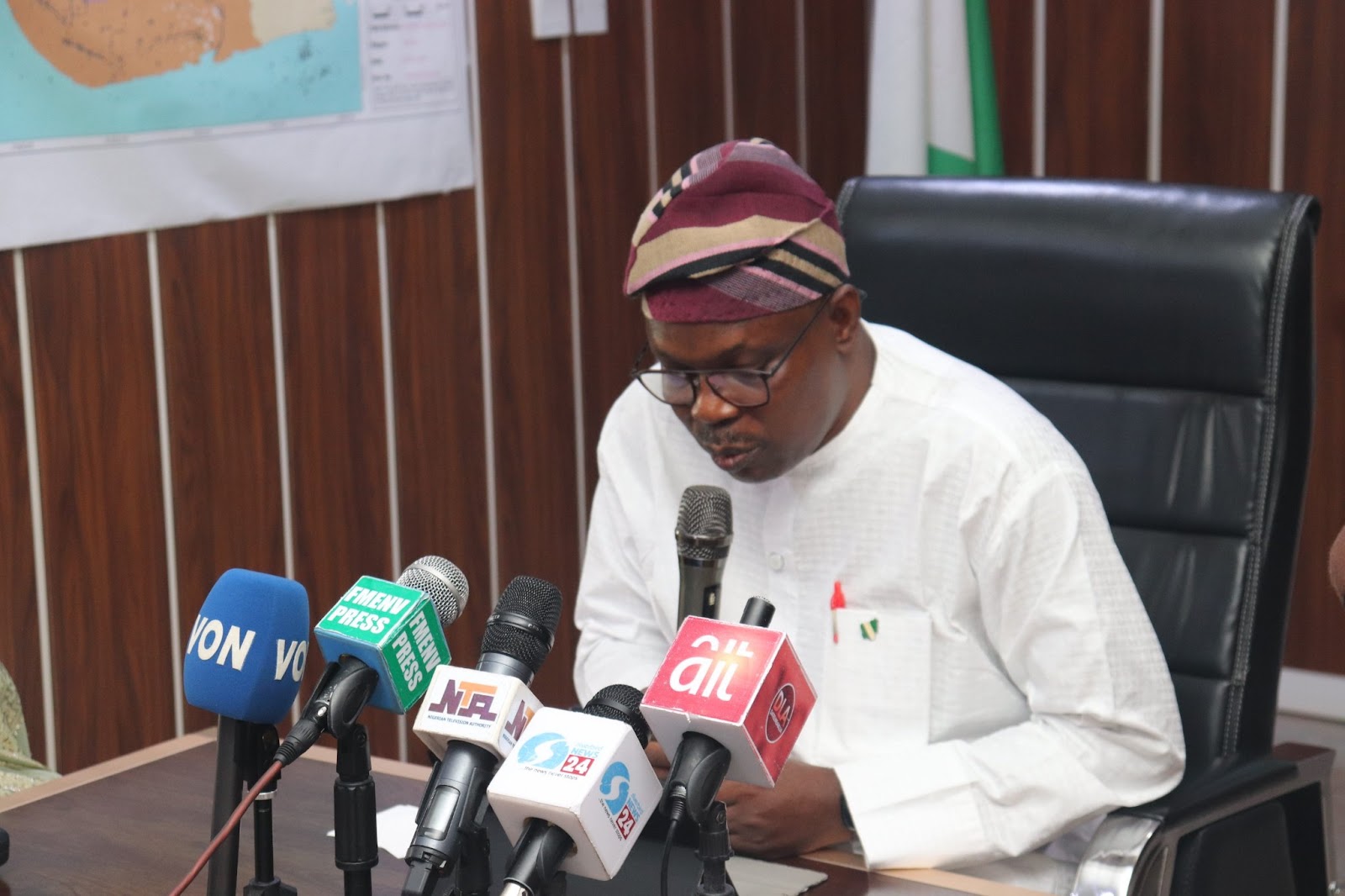BY CHIKA OKEKE, Abuja
Minister of State for Environment, Dr. Iziaq Adekunle Salako while briefing the media on interventions by Environmental Health Council of Nigeria (EHCON) to mitigate the 2024 flooding across the states in Abuja on Wednesday.
At least, 300 persons have been confirmed dead, 80, 000 houses damaged while over 1,000, 000 have been displaced in 176 Local Government Areas as flood wrecked 29 States.
The affected states are Ogun, Rivers, Imo, Lagos, Ekiti, Edo, Kwara, Adamawa, Niger, Kogi, Katsina, Taraba, Kano, Kebbi, FCT, Anambra, Delta, Bayelsa and Ebonyi.
Also, Gombe, AkwaIbom, Cross River, and Osun States, while Borno, Bauchi, Zamfara, Sokoto, Niger and Jigawa are worst-hit by the disaster.
Minister of State for Environment, Dr. Iziaq Adekunle Salako stated this on Wednesday in Abuja while briefing the media on Interventions by Environmental Health Council of Nigeria (EHCON) to mitigate the 2024 flooding across the states.
While describing the flooding as worrisome, he sympathised with the victims spread all over the Federation especially in the worst-hit states.
He noted that the ministry is concerned about the extreme weather conditions that resulted to flooding, adding that besides the economic loss, the disaster could usher in more worrisome deadly flood-related diseases and health conditions.
Salako recalled that last week, a delegation of the Federal Ministry of Environment led by the Minister, Mallam Balarabe Abass Lawal visited Maiduguri for an on-the-spot assessment of the damages.
As a result of the visit, a team consisting of representatives of EHCON, Department of Pollution Control and Environmental Health, Department of Flood, Erosion and Costal Zone Management and the National Park Services have been mobilised to Maiduguri to perform several post flood services.
He cautioned Maiduguri residents and stakeholders to be wary of diseases such as diarrhea and cholera that may likely occur from the use of contaminated water for cooking and drinking.
The minister disclosed that other diseases like malaria, hook worm and tape worm might worsen as a result of parasitic activities in the environment.
He said: "Hepatitis A and B could spread in an acute form where people are bound to use water contaminated with faecal matter and share food and food containers that may have been contaminated with the virus.
"Yet, another group as silicosis, asbestosis, asthma and cancer may prevail as a result of the residents exposure to chemical substances washed into flood waters, thus impairing the cardiopulmonary functions of the human system.
"It is well established that the flood waters which stagnate are breeding sites for insect vectors such as mosquitoes, helminths and microbes like escherichia coli, vibrio cholera, salmonella typhi, hepatitis A & E viruses, polio virus that lead to diarrhea, cholera, typhoid fever, and hepatitis A & E diseases respectively.
"Food poisoning, chemical poisoning, arthritis, rheumatism, allergic reactions and mycotoxins are also among the conditions negatively affecting human health arising from flooding," he added.
Salako informed that fertilizers, herbicides and other agro allied products from flooded farmlands constitute chemical hazards that are introduced into water bodies, noting that contaminants such as heavy metals (lead, mercury, arsenic, cadmium), nitrates and nitrites, volatile organic compounds, asbestos, silicon, and chlorofluorocarbons pose grave risk to human health.
The minister lamented that radioactive materials washed from hospitals, construction sites, industries and mining sites impact the environment negatively, saying that injuries arising from accidents like fall and drowning in flood waters constitite public health hazards.
As a result of the exposures, terrestrial and aquatic habitats are destroyed, even as psychological hazards such as trauma, depression and stress, are common after-effects associated with flood disasters.
He maintained that increased insect bites and vermin attacks pose more danger on humans, as venoms, secretions, and toxins are introduced into the body system, thereby causing blisters, skin rashes, dermatitis, fever, nausea, vomiting and even death.
Salako listed another vector borne disease as leptospirosis, which he described as an upper respiratory tract infection caused by infected animals when human come in contact with excremental materials of dogs, rats, livestock and wildlife.

Comments
Post a Comment